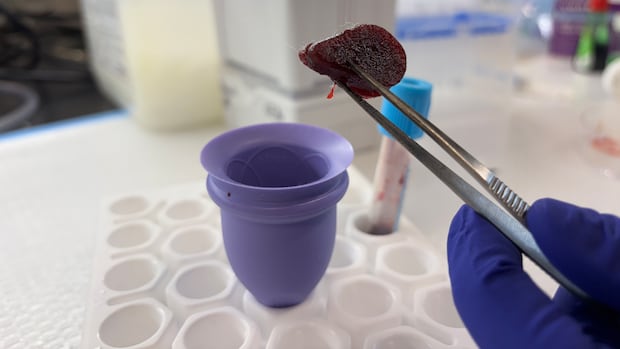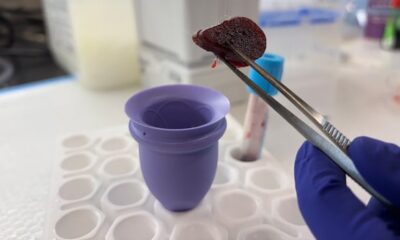Science
McMaster Researchers Innovate Menstrual Cups with Absorbent Tablets

Innovative researchers at McMaster University have developed a new solution aimed at enhancing the user experience of menstrual cups. Professors Zeinab Hosseinidoust and Tohid Didar have created absorbent tablets designed to work in conjunction with menstrual cups, addressing concerns about messiness that often deter individuals from using these eco-friendly products.
According to UN Women, over two billion people globally menstruate, yet advancements in menstrual products have lagged behind. Hosseinidoust, a professor in the department of chemical engineering at McMaster, noted, “This is a field ripe for innovation. There is so much that can be done. And then there are very, very simple needs that are not met.”
The researchers’ new tablets are intended to make menstrual cups more accessible and user-friendly. During a recent demonstration, Shaghayegh Moghimi, a PhD candidate involved in the project, explained how the tablets are produced and utilized. The tablets are made from biodegradable materials derived from seaweed, making them flushable and inexpensive to manufacture.
Addressing Period Stigma and Practicality
Recent studies have indicated that in Canada, one in six menstruators has experienced period poverty, with individuals spending an average of $6,000 on menstrual products throughout their lives. Notably, one in four Canadians believe periods are dirty and unclean, according to federal government research. This societal stigma contributes to the reluctance of some individuals to adopt menstrual cups, despite their environmental and financial benefits.
Hosseinidoust stated that many comments on social media highlight concerns about potential messiness associated with menstrual cups. “A lot of them ask, ‘what about the mess?’ So there is that concern, whether it’s real or not,” she remarked. The tablets aim to alleviate this issue, providing a straightforward solution to a common problem.
McMaster student Dior David shared her thoughts on the innovation, saying, “The tablets are a great idea.” David emphasized that having a product that simplifies changing menstrual cups in public restrooms could significantly enhance convenience. “I think that one of the reasons why I decided to empty my cup in the showers is because I want to avoid the mess, and [a tablet] would just be very easy to deal with,” she added.
Potential Health Benefits
While the tablets are single-use, which could conflict with the sustainability goals of menstrual cups, their biodegradable nature and low production costs position them as an attractive option. By encouraging more people to try menstrual cups, the tablets could help decrease the billions of disposable menstrual products discarded daily.
Additionally, the tablets have potential health benefits. Hosseinidoust is exploring the integration of bacteriophages—viruses that selectively target harmful bacteria—into menstrual products. “One of the things that we’re looking into is integrating these bacteriophages with some of these menstrual products to both detect and get rid of infections,” she explained. This research could extend beyond the tablets, potentially benefiting a range of menstrual health products.
Laboratory manager Lubna Najm and Moghimi are also part of this significant research initiative. Hosseinidoust described her discovery of the lack of innovation in menstrual health as akin to finding a gold mine. “But at the same time, as a woman, as a menstruating person, you think, ‘really?’” she said, reflecting on the long-standing neglect of this area.
The development of absorbent tablets represents a crucial step forward in addressing both practical and societal challenges associated with menstrual health. It highlights the importance of innovation in creating inclusive products that meet the needs of a diverse population. As conversations around menstruation continue to evolve, initiatives like this may play a vital role in reducing stigma and enhancing accessibility for all.
-

 World4 months ago
World4 months agoScientists Unearth Ancient Antarctic Ice to Unlock Climate Secrets
-

 Entertainment4 months ago
Entertainment4 months agoTrump and McCormick to Announce $70 Billion Energy Investments
-

 Lifestyle4 months ago
Lifestyle4 months agoTransLink Launches Food Truck Program to Boost Revenue in Vancouver
-

 Science4 months ago
Science4 months agoFour Astronauts Return to Earth After International Space Station Mission
-

 Technology2 months ago
Technology2 months agoApple Notes Enhances Functionality with Markdown Support in macOS 26
-

 Top Stories3 weeks ago
Top Stories3 weeks agoUrgent Update: Fatal Crash on Highway 99 Claims Life of Pitt Meadows Man
-

 Sports4 months ago
Sports4 months agoSearch Underway for Missing Hunter Amid Hokkaido Bear Emergency
-

 Politics3 months ago
Politics3 months agoUkrainian Tennis Star Elina Svitolina Faces Death Threats Online
-

 Politics4 months ago
Politics4 months agoCarney Engages First Nations Leaders at Development Law Summit
-

 Technology4 months ago
Technology4 months agoFrosthaven Launches Early Access on July 31, 2025
-

 Top Stories2 weeks ago
Top Stories2 weeks agoFamily Remembers Beverley Rowbotham 25 Years After Murder
-

 Top Stories5 days ago
Top Stories5 days agoBlake Snell’s Frustration Ignites Toronto Blue Jays Fan Fury


















